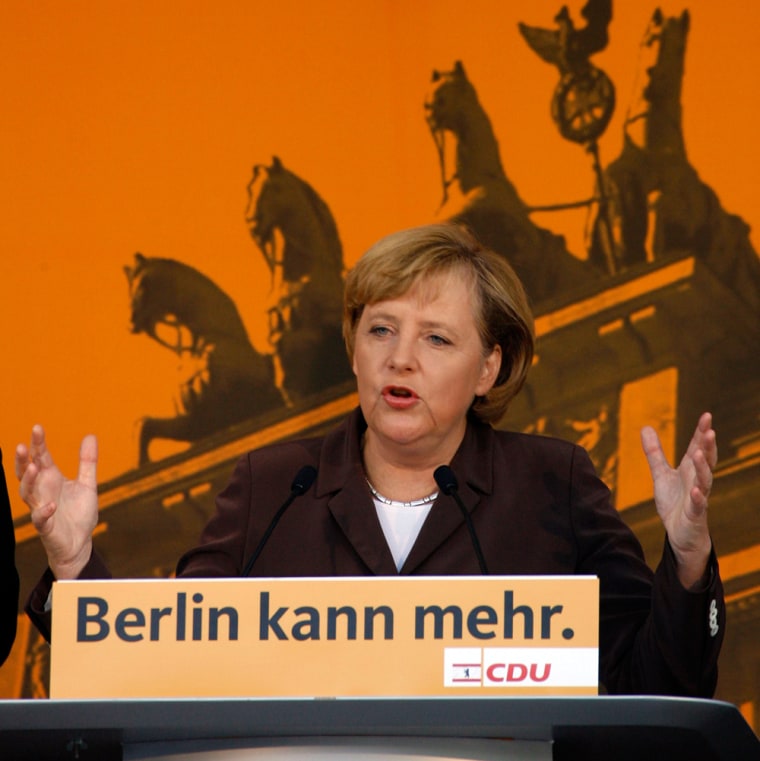Germany said Thursday that Iran’s response to a package of incentives to halt its nuclear program was unsatisfactory because of its refusal to freeze uranium enrichment, and diplomats suggested Tehran now faces a greater risk of U.N. sanctions.
Two senior diplomats who were briefed on the Iranian response told The Associated Press that world powers would likely reject it.
The U.N. Security Council has set a deadline of next Thursday for Iran to freeze enrichment — a possible pathway to nuclear arms — and the six nations offering to talk to Iran say such a step must precede the start of any discussions.
But the diplomats said the 25-page document does not directly suggest an enrichment moratorium even after negotiations start.
Instead, it includes only a vague reference to a willingness to discuss all aspects of the country’s nuclear program, said the diplomats who spoke from two European capitals and asked for anonymity because they were not authorized to discuss the confidential proposal.
They said the reaction among the six powers — France, Germany, Britain, Russia, the United States and China — was one of disappointment and even anger that Tehran would not consider a suspension of uranium enrichment as a precondition for any new talks.
Merkel steps up
A day after the U.S. administration issued a guarded assessment of Iran’s long-awaited response, German Chancellor Angela Merkel on Thursday said it was unsatisfactory, and was missing a “decisive sentence” on whether it would halt uranium enrichment.
“We are still examining it, but from everything that I hear we cannot be satisfied,” Merkel said in an interview with N24 television. “What we expected is not set down here: ’We are suspending our uranium enrichment, we are coming to the negotiating table and we will then talk about the chances and possibilities for Iran.”’
The comments by Merkel, a close ally of President Bush, reflect the increasing frustration of the United States and its key European allies who have been forced to wait for several weeks for an Iranian response.
White House spokeswoman Dana Perino said Bush spoke Thursday with Merkel and Italian Prime Minister Romano Prodi about Iran, but Perino would not say whether the leaders were of the same mind about what should be done next.
Little of substance, diplomats suggest
The U.S. State Department has said that Iran considered its proposal to be a serious one and promised to review it, as did the five other nations that offered political and economic rewards to Tehran July 1 if it agreed to a freeze enrichment.
But the diplomats suggested that despite assurances of a serious review, the capitals involved found little of substance in the document.
One of them said that much of the Iranian response, delivered Tuesday, confines itself to “a history of Iran’s nuclear program from Tehran’s point of view,” including arguments that enrichment was its right under the Nuclear Nonproliferation Treaty.
In it, Iran also asks for more information on various elements of the July 1 offer, including hints that Tehran’s cooperation could lead to bolstered security for the country and the possibility that some or all U.S. sanctions might be lifted if there is agreement, said one of the diplomats.
One of the diplomats told AP that the lack of Iranian flexibility on enrichment would likely leave even Russia and China no choice but to ultimately endorse U.N. sanctions against Iran. Moscow and Beijing previously have steadily put the brakes on U.S.-backed efforts to punish Tehran quickly but have stipulated that Iran must freeze enrichment.
Tehran claims ‘positive, clear signals’
Iran maintains it has offered “positive and clear signals” to resolve the dispute over its nuclear program.
Although neither Iran nor its six interlocutors have released the text of Tehran’s counteroffer, two well-informed Iranian academics said it included about 100 questions, including a request for a timetable for the West to implement its incentives package.
Abbas Maleki, director of the International Institute For Caspian Studies in Tehran, and Kevah Afrasiabi, an author and political scientist, made the statement Thursday in a report distributed by Agence Global.
The two also said that Iran’s chief nuclear negotiator, Ali Larijani, had declared Iran’s willingness to use its influence in Lebanon for an exchange of prisoners held by Hezbollah and Israel, “reminding the world of Iran’s stabilizing role.”
France calls on Tehran to suspend
French Foreign Minister Philippe Douste-Blazy said Wednesday that Iran must suspend uranium enrichment if it wants to return to negotiations.
And the U.S. statement issued Wednesday went on to say that Iran’s response to a joint offer of U.S. and European trade and other benefits if the enrichment program was halted “falls short of the conditions set by the Security Council” — full and verifiable suspension of all uranium-enrichment activity.
Others are urging patience in dealing with Iran. Russia’s foreign ministry said it would continue to seek a negotiated solution, and China appealed for patience and more dialogue.
The Security Council resolution gives Iran until next Thursday to suspend enrichment. The Vienna-based International Atomic Energy Agency then will report on the state of the program by mid-September. If IAEA chief Mohamed ElBaradei’s report finds that enrichment is continuing, as expected, the council is then likely to move toward economic and political sanctions.
